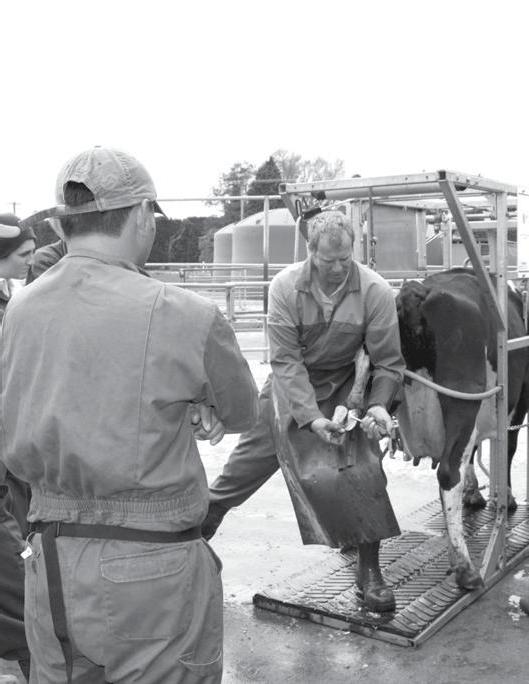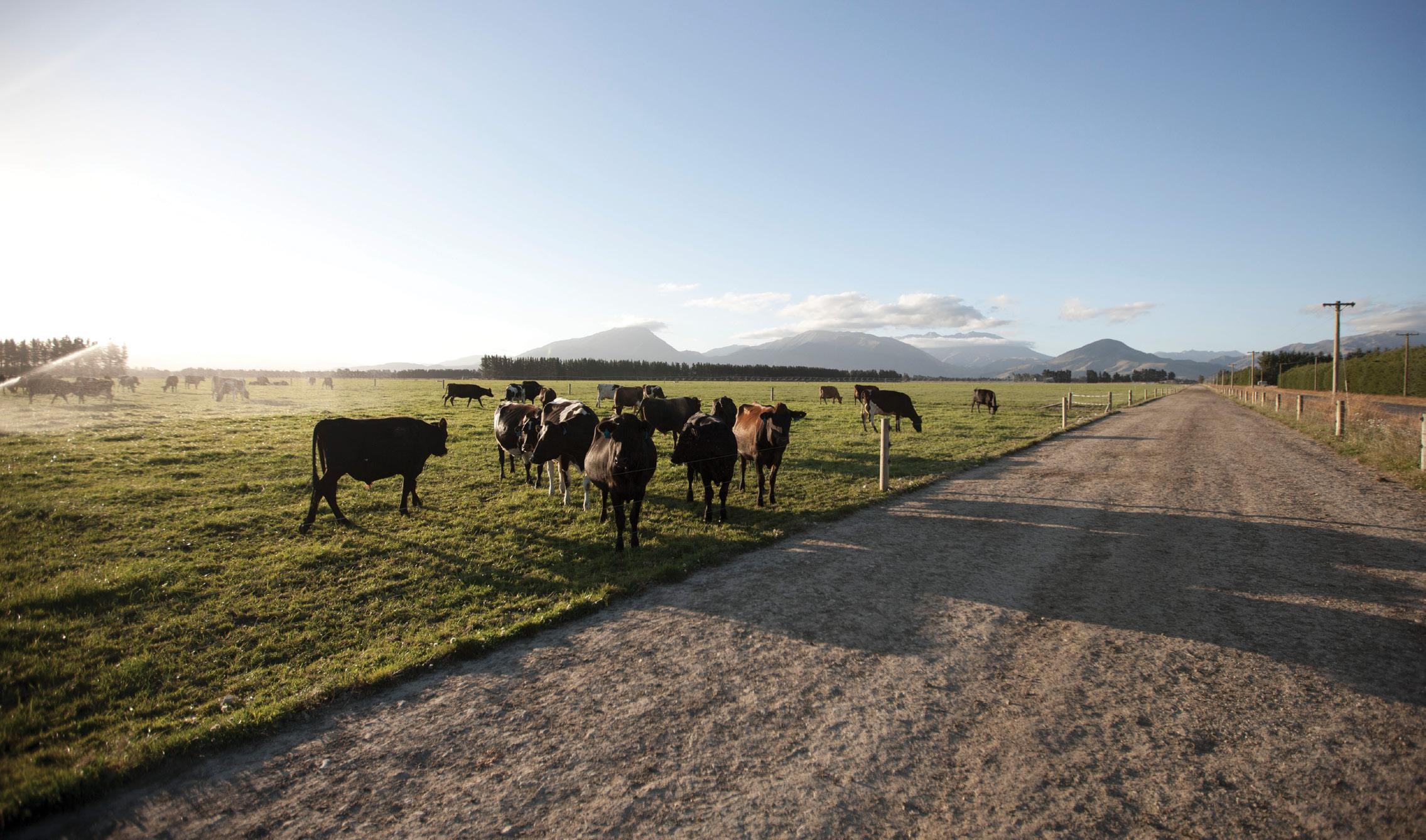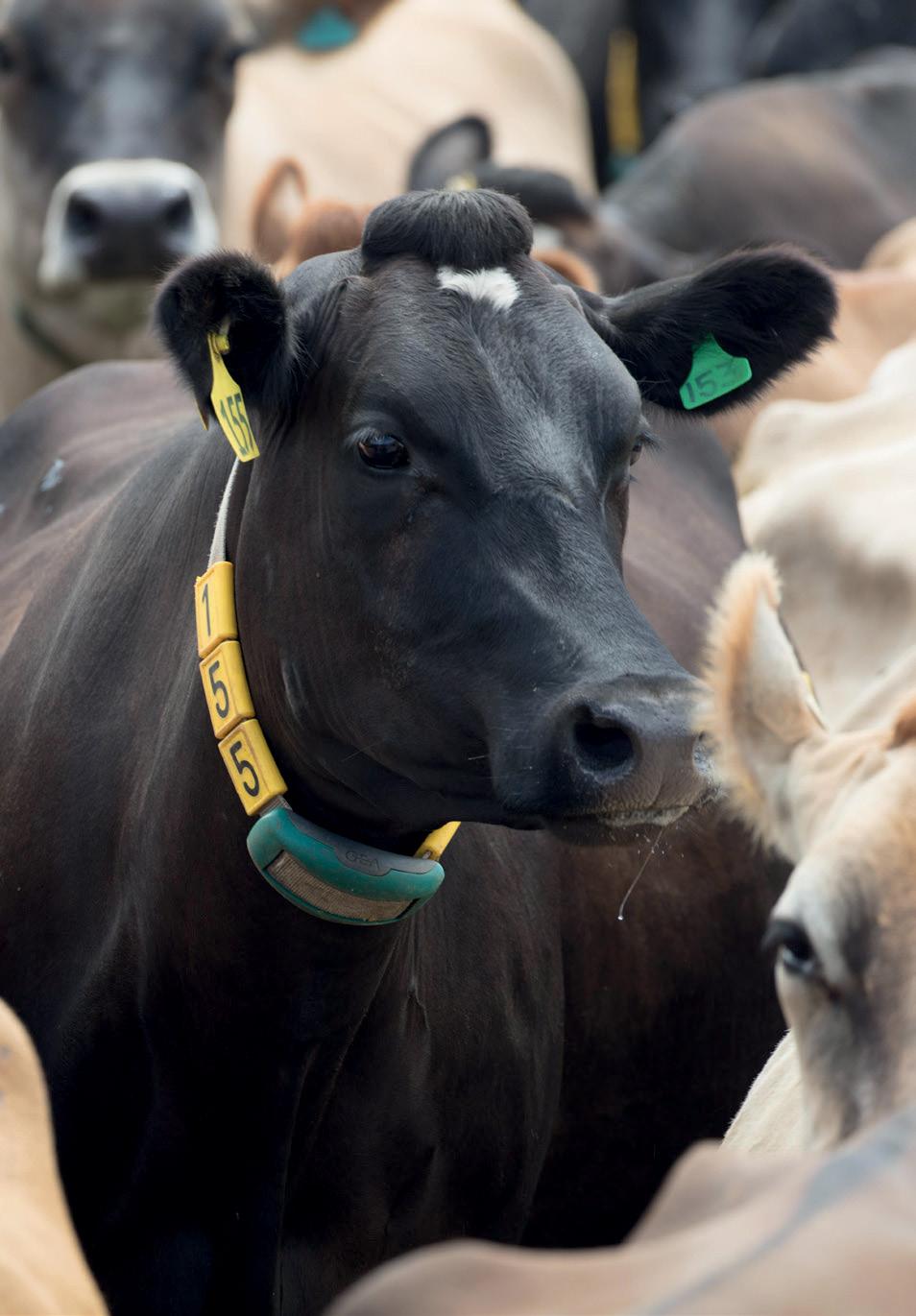
9 minute read
Share farmer: Ann & Scott Henderson
Complimentary skills – a winning formula
Left: Cup of champions: Ann and Scott Henderson with the 2021 Southland Otago Share Farmer of the Year trophy.
WORDS AND PHOTO BY KAREN TREBILCOCK
Apeople-first philosophy and excellent onfarm systems helped Scott and Ann Henderson win the 2021 Southland Otago Share Farmer of the Year competition.
The couple has been at the Adams Flat Road farm near Milton for four years, the first two as managers.
The 560ha farm (490 effective) was converted 23 years ago by the late Howard Paterson and is now run by his trust Whitestone supplying French food giant Danone’s Clydevale plant.
With the 50:50 sharemilker leaving, the trust asked them to stay on and a 25% sharemilking contract was agreed to with the Henderson’s buying the herd of 850 cows over three years.
“We own 365 cows now and at the end of June 2022 we will own all of them and will be 50:50 sharemilking,” Ann said. “The trust and Westpac have been backing us 110%. We couldn’t be doing this without them,” Scott said.
“There are many pathways for people in the industry to progress. You’ve just got to find what one suits you best,” Ann said.
Scott was a qualified carpenter in Balclutha when he met Ann who, from a sheep and beef farm near Edinburgh in Scotland, had also fallen for New Zealand dairying.
She was working on a farm near Gore and he followed, first working as a tractor driver and doing a bit of building but on his days off he would help Ann on the farm.
“The more I learnt about dairying, the more I enjoyed it,” he said.
The neighbour offered him a second in charge (2IC) position and “I’ve never looked back”.
Although his building skills do not go amiss on the farm.
“I think that’s why we work so well together,” Ann said. “We have totally different skill sets. My strengths are cows and grass and Scott’s are cultivation, crops, fertiliser and maintenance.
“And we both deal with the financials, human resources and day to day running of the farm.”
“If the cows are happy, I know I will have a happy wife,” Scott said.
It was while Ann was an assistant manager near Gore that she won the Dairy Industry Awards Southland Otago 2017 manager of the year.
Back then, she said farm ownership for the couple was 15 years away and they are still on track.
Where that farm will be they’re not sure although they like farming in South Otago.
“We started in Southland and have been steadily moving north so who knows?” she said.
FINANCIAL FACTS
Sharemilking
25% Lower Order sharemilking Costs shared 25% Lower Order sharemilking - costs are labour, power, shed expenses, 25% inshed feeding, gear and maintenance Gross farm income $1.77/kg MS Operating expenses $1.47/kg MS Operating profit $753/ha Farm working expenses $0.87/kg MS Breakdown of costs Wages $0.39/kg MS Electricity $0.12/kg MS Bought-in feed $0.07/kg MS
PHYSICAL FARM DATA
Milking platform area
560ha
490ha effective, Milking platform 340ha
850
Kiwicross cows
Pasture eaten
11t DM/ha/yr
Production 405kgMS/cow • 1014kgMS/ha
Milking supplement
200t barley = 235kg/cow Farm Dairy
60-bail rotary
Dairy Automation
ACRs, Trutest autodrafting, auto teat spray
170
Cows/labour unit
75%
Six-week in-calf rate
Not-in-calf rate
11%
Wintering Cows - half on half off, all youngstock winter on, Everything on fodderbeet and balage, plus straw
10
Weeks of mating
150kg N/ha/year
Nitrogen
Watching her succeed in the Dairy Industry Awards made Scott keen to give the share farmer competition a go although Ann wanted to wait a few more years to have everything right.
AWARDS A HUGE AMOUNT OF WORK
“I said there is never a right time to do things so we entered this season for the first time,” he said.
“It’s a huge amount of work but you get out of it what you put in,” she said.
“The feedback from the judges is invaluable, and the people you meet along the way.
“We wouldn’t be on this farm now if I hadn’t won the manager’s section.”
The couple took their three staff and their partners to the Saturday night function in Invercargill and all were blown away with how big the event was.
“They were all part of it – we had them help out with the presentation with the judges.”
For the Hendersons, supplying Danone is not the same as supplying Fonterra. The milk room has a lock on it and the vat has a daily tag. No tag, no pick up by the tanker.
There are three shed inspections a year, two are unannounced.
“Everything has to be kept at a high standard every day,” Ann said. “Which is how we like to farm too.”
Half of the payout is fixed for two years, which makes budgeting easier, and the other half floats with commodity prices.
As well, there is up to 20c/kg MS on offer if milk quality, environmental and animal welfare standards are met.
“We grade at 350 somatic cells, which is lower than Fonterra,” Scott said.
“All of our milk goes into baby formula to feed the globe. We take pride in it leaving at the highest quality,” Ann said.
They use a private Facebook messenger group to stay in touch with staff and all take part in recording on-farm events, including a photograph of the allimportant tagging of the vat each day.
Farm systems are documented on the dairy walls and farm manuals are kept handy in the dairy’s office.
“Systems are key to a good business,” Ann said.
Even though they know they’re doing everything as well as they can, the public perception of dairying still worries them.
“We are trying to turn it around. We’re doing everything we can to be good dairy farmers,” Scott said.
NO EXPERIENCE? NO PROBLEM
Coming from another industry himself, Scott is keen to give people with no experience a go. For example, one of their staff used to be a shearer.
“A lot of jobs are for people with experience but experience doesn’t come from nowhere. If someone is willing to give it a go and they fit in with our values and purpose then we will employ them,” he said.
“In schools, there is not a lot of push for kids to become dairy farmers and it’s sad. It’s such a great industry to be part of,” Ann said.
They put people as number one on the

How can you cut the high cost of lameness on your farm?
Gain knowledge and practical skills.
Fred Hoekstra, Dairy Hoof Care Institute’s qualified instructor, empowers farmers and industry professionals with vital insights, knowledge, and step-bystep techniques to treat and prevent lameness. Students can also gain industry-recognised qualifications. DHI’s one day workshops and courses: •Lameness Management Workshop •Practical Hoof Care Workshop •Advanced Hoof Care Management Course •Veterinarian Hoof Care Workshop
Visit dhi.ac.nz for workshop and course details.

farm and both enjoy training staff. All their staff are enrolled in Primary ITO courses and one of their plans is to have a Gateway high school student spend time onfarm.
With the farm’s steep terrain, they make sure they have an excellent health and safety culture.
All the farm’s all terrain vehicles (ATVs) have roll-over bars and light bars fitted. Farm staff have head torches and must wear helmets and high-vis jackets when using the ATVs. There are also a lot of nogo areas on the farm.
“The steep paddocks we use as day paddocks because we don’t want anyone riding around them in the dark. In the really steep paddocks we use a dog to go get the cows or young stock.”
Half of the cows are wintered at Moeraki at a graziers while the other half and the young stock stay onfarm.
FRESH BEETS
The Brigadier fodder beet paddocks are cropped for two years then planted in oats as a catch crop which is made into whole crop silage or baled into balage before finally going back into grass.
A grazing plan is followed with crop fed down slopes. Swales and critical source areas are grazed last. Portable water troughs are moved daily and the backing fence kept close.
“We get the contractors and seed reps and staff together and plan the winter grazing each year to make sure we’re doing it the best we can and to manage any risk,” Scott said.
SHARE FARMER MERIT AWARDS:
DairyNZ Human Resources Award – Scott & Ann Henderson Ecolab Farm Dairy Hygiene Award – Matthew & Moniek Van Hout Federated Farmers Leadership Award – Matthew & Moniek Van Hout Honda Farm Safety and Health & Biosecurity Award – Scott & Ann Henderson LIC Recording and Productivity Award – Matthew & Moniek Van Hout Meridian Farm Environment Award – Scott & Ann Henderson Ravensdown Pasture Performance Award – Scott & Ann Henderson Westpac Business Performance Award – Scott & Ann Henderson
Runner-up share farmers were Winton contract milkers Matthew and Moniek van Hout and third were Drummond contract milkers Craig and Olivia McGregor.
Left: Beet this: Ann and Scott are proud of their fodder beet crop.
“At the end of the day, no one wants their cows in mud,” Ann said.
“And we don’t want soil erosion either,” she said.
With no irrigation, they plan for dry summers planting 20ha of summer turnips which is also part of their regrassing programme.
They’ve found the Aber high sugar grasses work best in their climate and soils but they add in timothy, chicory, plantain and red and white clovers as well.
They’re also ready for snow in winter as well as during calving. At least once a year the tanker doesn’t make it up the gravel road because of it.
Cows are a huge passion for the couple. They both like black cows and find LIC Kiwicross cows to be economical. The herd is closing in on a kilogram of milk solids per kilogram of liveweight.
The steep terrain has made a feed pad near the dairy a must so there is little feeding out on paddocks with tractors plus they’ve converted the farm’s old woolshed to a calving pad.
“We’re really enjoying enhancing this farm and the trust is right behind us,” Scott said.
Next on their list is extending the effluent K-lines from covering 53ha to 140ha and to start planting riparian areas with natives to add to the trees already there.
Ann’s family came from Scotland to their wedding two years ago and the couple have plans to visit them once Covid has loosened its hold on the world.
“They’ve been in seven months of lockdown now over there. It’s been really tough,” Ann said.
“But it’s been really tough for our staff too.
“We have one here from Chile and one Filipino and we make sure they keep communications up and we make sure everyone is happy as much as we can.
“People, animals and the environment are always our focus.”










